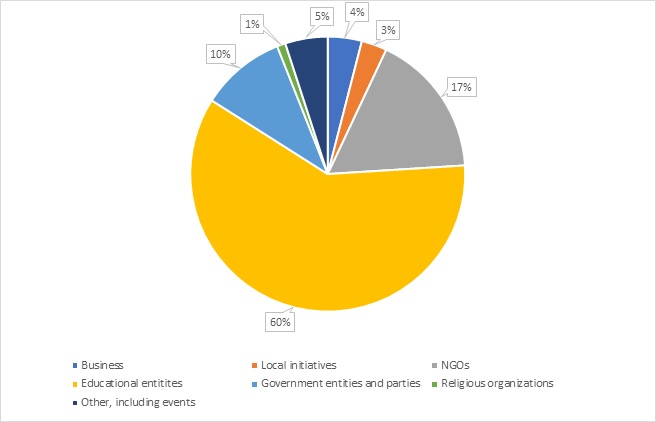Between December 2020 and February 2021, three times more voting sessions were conducted on Polys, a blockchain-based voting platform from the Kaspersky Innovation Hub, than the previous year.
Between December 2020 and February 2021, three times more voting sessions were conducted on Polys, a blockchain-based voting platform from the Kaspersky Innovation Hub, than the previous year. The surge was revealed following analysis of anonymized metadata from the platform. While the top two sectors leading the way in terms of share of voting sessions remained the same - educational entities and NGOs - the range of other sectors changed over this period.
The lockdown measures that, by March 2020, had reached more than 100 countries, moved many aspects of people’s daily routines online; including work, shopping and social interactions. The research into anonymized sessions from blockchain-based voting platform, Polys highlights that people also started to make more joint decisions via this online access.
To see how the pandemic had affected the extent of remote voting, researchers examined statistics three months prior to the global measures being enacted, starting from December 2019, when many organizations discussed their end-of-year results. These were then compared with results from December 2020 - February 2021.
During this period, the most active segment for online voting was education - 60% of sessions were carried out by organizations from the industry, while a year ago this figure only accounted for 43% of the polls. This was followed by non-governmental organizations, who conducted 17% of sessions through this method, which is two percentage points more than the same period a year ago. The share among governmental organizations and parties also grew from 6% to 10%. This made it the third most active vertical, replacing votes on business matters.
This is not the only change seen over the course of the year. As gatherings in large groups were generally avoided, less than 1% of voting was held at public events, whereas previously, 7% of sessions fell into this category. Experts also noticed that joint decisions on local initiatives also dropped from 3% from December 2019 - February 2020, to 1% later that year, suggesting that such projects had been put on hold. However, in December 2020 - February 2021 their share returned to 3%, as discussions around local initiatives returned.

Share of blockchain voting cases by industries
“We have seen interest and trust in voting via blockchain rising. Over the past year, people didn’t only return to our platform, but also advised their friends and colleagues to test it too. For example, we saw that after online voting in education, local business also voted on our platform. With self-isolation measures, secure online voting has become almost the only way to continue collaborative activities, which has accelerated its adoption," comments Alexander Sazonov, Head of Product, Polys.
More information about Polys is available via this link.
About Kaspersky
Kaspersky is a global cybersecurity and digital privacy company founded in 1997. Kaspersky’s deep threat intelligence and security expertise is constantly transforming into innovative security solutions and services to protect businesses, critical infrastructure, governments and consumers around the globe. The company’s comprehensive security portfolio includes leading endpoint protection and a number of specialized security solutions and services to fight sophisticated and evolving digital threats. Over 400 million users are protected by Kaspersky technologies and we help 240,000 corporate clients protect what matters most to them. Learn more at www.kaspersky.com.
